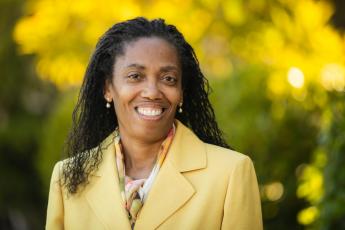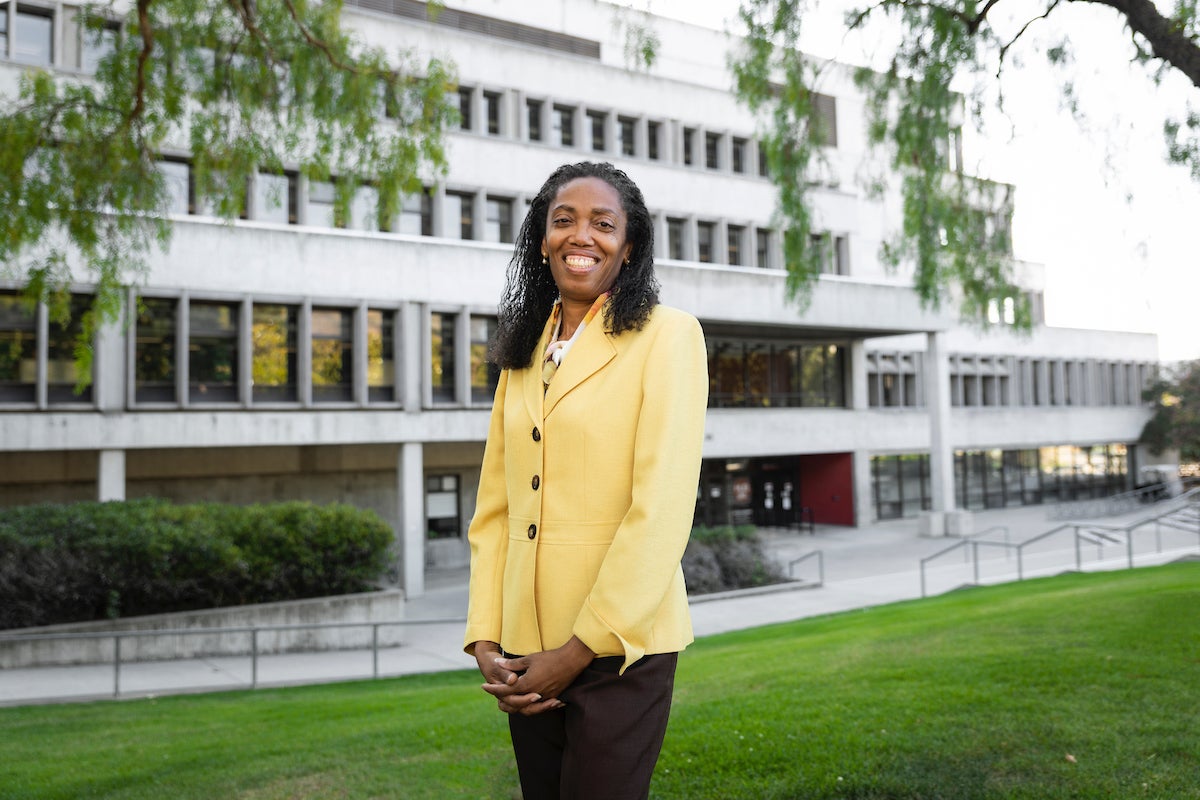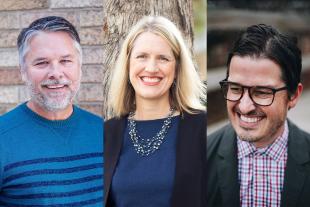‘It’s All About Service to Others.’ New Provost Cynthia Jackson-Elmoore on What it Means to Lead

This spring, Cynthia Jackson-Elmoore accepted a position as Cal Poly’s new provost and executive vice president for academic affairs.
After beginning her career in engineering, Jackson-Elmoore transitioned to the study of public policy and urban affairs. Prior to coming to Cal Poly, she spent her academic career at Michigan State University, where she taught and served in various administrative roles. Most recently, she was dean of MSU’s Honors College, co-chaired the university’s diversity, equity and inclusion committee and was a member of the university’s strategic planning committee.
Now in San Luis Obispo and in her first month at Cal Poly, Jackson-Elmoore is responsible for the entire academic effort as provost, both inside and outside the classroom, and collaborates across campus to set academic priorities and allocate resources toward effective learning opportunities. Her purview includes Cal Poly’s six colleges, the Kennedy Library, and international and extended education. She also shares oversight of research and economic development, graduate education, financial aid, the registrar’s office, admissions and enrollment.
Jackson-Elmoore met with Cal Poly News to discuss her goals in her new role and what it means to be a leader. Here are some excerpts from her interview.
What attracted you to Cal Poly? Cal Poly means a lot to me even in the short time that I’ve been here. It's a big decision to move across country, period, let alone in the middle of a pandemic. And I saw enough to know that I belong here. I can help make a difference, and I want to be a part of the meaningful change that I believe is going to happen.
I really appreciate the pillars of Learn by Doing, the teacher-scholar model and the idea of being Ready Day One. What really struck me about that is increasingly, businesses and industries want employees to show up and do the job. It used to be a time when you got in your first job and you could learn as you go, and that's less the case now. And so really the focus on graduates being Ready Day One was really important to me.
Tell me about your academic background. What drew you to study engineering, to study public policy and eventually urban affairs? Engineering was a choice that was made for me. I came through at a time when if you were a woman or a person of color and you were good in math or science, you really were steered into engineering.
I started an engineering degree program and then actually realized fairly soon that maybe I didn't want to do that. But I also knew that I couldn't go wrong with an engineering degree. I finished the degree and worked as a process engineer in a hot glass manufacturing plant, and I absolutely loved it.
I also knew that there was something else I wanted to do. That's what pulled me into public administration. I won't say that I chose that as much as that it emerged, but it was much more consciously my stepping into it.
My focus is state and local public policy. It's a very different lens compared to national or international public policy. My research has typically been about how policies impact communities. And then I also look at how communities or organizations can shape policy. I'm interested in questions like, “How do you create access? How do you get a voice? How do you give leverage to disenfranchised populations or organizations that might be marginalized?”

What pushed you to move from teaching and research toward more administrative roles? What are the challenges and opportunities of that transition? At each stage in my faculty career — assistant, associate, full professor — I held leadership or administrative roles, so for me, there was never this hard and fast transition. I don't shed skins. I adapt and move and pivot, and I keep all my previous experiences and roles in mind. I don't know how to not think about how to contribute to the whole, which is what I think is a key responsibility of administration.
I think there are more opportunities than challenges. And I think as a collective, we haven't done a good job in higher education of helping people see all the ways that administration can be energizing and exciting and life altering and transformational, not just for us, but for those we interact with.
Administration and leadership are really about helping create opportunities for others. It's not about yourself at all. And anyone who thinks it's about yourself will be in for a rude awakening at some point in their administrative life, because it is about service to others.
What are your first priority goals for your tenure at Cal Poly? I really have to learn more about our students, our faculty, our staff, our community, our operations, and continue to gain a really strong sense of the pulse of Cal Poly.
That has to be first and foremost, because the first, last, and constant priority is going to be to ensure that our students, staff and faculty are successful. That's always going to be a foremost priority for me.
I'm going to be a really staunch advocate for Academic Affairs, but I am also going to endeavor every day to be the best possible partner with the entirety of our community and our university. It's a community that cares deeply that our students succeed, and I want to honor that. I want to honor the work that our faculty and our staff are doing.
What did you learn as a dean at MSU that you think will serve you well in this new role? I really do see any type of leadership role as service. It's the opportunity to shape how policies shape people’s experiences.
I've learned the importance of organizational climate — that multiple perspectives have to be considered. As a leader, I help set the tone. And it matters, not just what I say, but sometimes what I don't say. It matters what I do and what I don't do.
Patience, compassion, resolve, vision, collaboration, grace. I've learned that all those things matter. And you must be a good listener. You must be. If you're not, you have to figure out how to get there quickly.
In your last position, you helped lead initiatives on diversity, equity and inclusion. How does that fit into your role as provost? This goes back to leadership setting the tone. I believe that diversity, equity and inclusion are everyone's responsibility. And I think that first and foremost leadership has to own it, has to live it, has to walk it, has to work in it.
I see it as a core part of what I do. I may not be the vice president for diversity and inclusion, but I am going to be a strong partner. It’s up to me to help set the tone.
There are no silver bullets when it comes to diversity, equity and inclusion. It's hard work. It takes a lot of resources. It's people, time, money, sometimes space. You have to go fast and slow at the same time. You have to take action, and you have to give enough pacing to bring people along.
What does it look like to infuse diversity into the full spectrum of what we teach at Cal Poly? That conversation happens with faculty. As provost, it's not my place to tell faculty what that looks like in their specific field or discipline. It is my place to advocate and keep those issues front of mind as faculty are developing their curriculum, and creating space to do that.
I will say that there are ethics and inclusion issues associated with every single profession or discipline, whether it's front and center or not. It doesn't matter what field we sit in. There are decisions we make that have implications for human life.
It's really about asking the questions that we may not have thought to ask, and finding ways to have conversations that broaden who is included.
How does your background in studying public policy contribute to your work as a university administrator? I would say that it’s not just my study of public policy — because engineers are systems thinkers and problem solvers. I am that before I'm a policy person, so I can't divorce myself of that and pretend that I took off one hat and put on another.
I think it's important to always have the big picture. For me that comes from both of those experiences — in both engineering and public policy, you always have to have a lens aimed towards the end game.
And you have to know the lay of the land. If you don't know it, you’ve got to figure out who can help you navigate. You've got to rely on the strengths of those around you. You build a strong team and you rely on them, and if you don't get to build a team, you’re joining a team and you figure out the assets and the strengths of those around you, and then you trust them. No one creates good policy in a vacuum.




